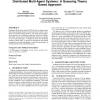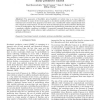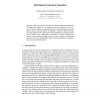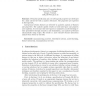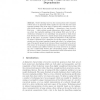1087 search results - page 28 / 218 » Achieving Distributed Control through Model Checking |
123
click to vote
ATAL
2005
Springer
15 years 7 months ago
2005
Springer
Distributed Multi-Agent Systems (DMAS) such as supply chains functioning in highly dynamic environments need to achieve maximum overall utility during operation. The utility from ...
107
click to vote
AUTOMATICA
2010
15 years 1 months ago
2010
: The guarantee of feasibility given feasibility at initial time is an issue that has been overlooked by many of the recent papers on stochastic model predictive control. Effective...
WAPCV
2004
Springer
15 years 7 months ago
2004
Springer
Detection of objects is in general a computationally demanding task. To simplify the problem it is of interest to focus the attention to a set of regions of interest. Indoor enviro...
109
click to vote
FMSD
2006
15 years 2 months ago
2006
A Promela specification and a set of temporal properties are developed for a basic call service with a number of features. The properties are expressed in the logic LTL. Interactio...
121
click to vote
CONCUR
2000
Springer
15 years 6 months ago
2000
Springer
Model checking based on the causal partial order semantics of Petri nets is an approach widely applied to cope with the state space explosion problem. One of the ways to exploit su...
